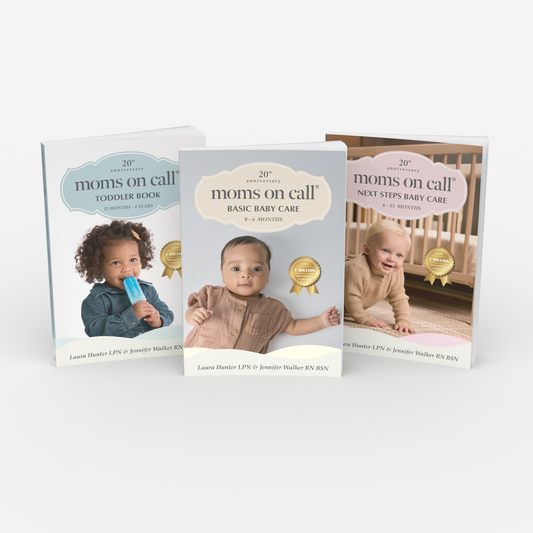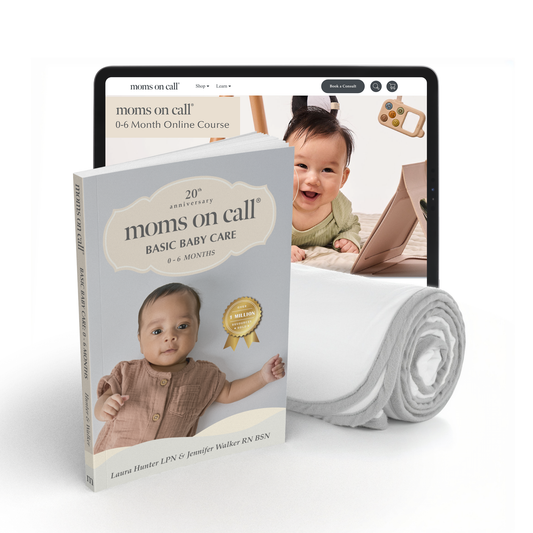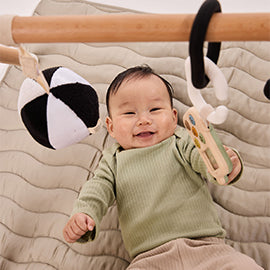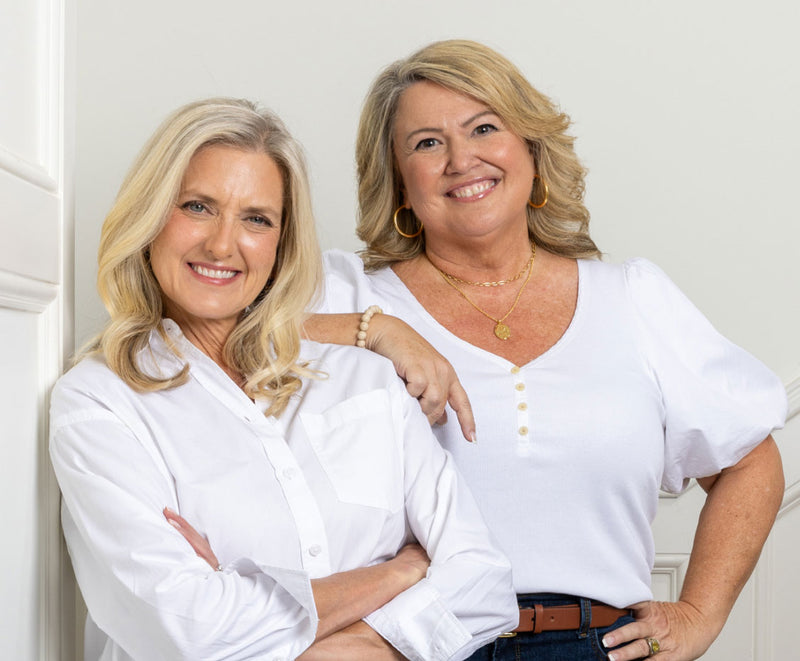We’re so excited to share the latest episode of our Moms on Call parenting podcast, all about babies and toddlers! Today we are discussing how much noise while feeding your baby is too much.
Intro: Is there no sweeter sound than your baby's adorable sounds in the world? Your baby makes the COOs; those little laughs can sweeten even the worst days. But today, on the podcast, a mom from Alabama worries about the sounds her nine-week-old daughter makes while feeding. What sounds are normal? What is cause for concern?
Intro: Whoever said babies and toddlers don't come with an instruction manual never met the Moms on Call. For nearly 20 years, Jennifer Walker and Laura Hunter have helped over half a million families navigate parenthood with their best-selling books, online courses, apps, and network of certified consultants. And now they have this podcast to talk directly with you. Ask your questions at 888-234-7979. Welcome to the Moms on Call podcast with Jennifer Walker and Laura Hunter.
How Much Noise While Feeding is Too Much?
Question 1: Hi there, moms! I'm Lindsay, residing in Auburn, Alabama. As a first-time mom to my nine-week-old daughter, I often find myself unsure of what's considered normal. Lately, I've noticed that she tends to make many grunting noises while drinking from her bottle and even sometimes breathes heavily. My pediatrician assured me that as long as she isn't choking or getting upset, these sounds are likely due to her taking in too much air during feeding, and there's no cause for concern. However, I'd greatly appreciate hearing from experienced moms who can shed some light on what kinds of noises are typical for infants during bottle feeding. Is being a noisy eater normal, or is she simply trying to figure out the whole feeding process? Thank you all so much for your input. Goodbye!
Host: I understood that Bryce was my child through a telling sign. As a toddler, he would consume his meals while producing various delightful noises. Witnessing this, I couldn't help but think, "Ah, he definitely takes pleasure in eating, just like his mama."
Host: I'm thrilled that you understand what I mean. Some of the noises Bryce makes while eating are a bit more slurpy, and we definitely know what you're talking about. There's this distinct clicking sound, almost like a 'blip,' and his expressions while producing those noises are priceless. I wish you could see the adorable face he makes!
You talked about this with the pediatrician. The pediatrician said, "Listen, this baby is growing, and they are healthy. This is strictly when giving a bottle."
Host: There are a few things to consider, and while we don't have all the details, it's important to acknowledge that you took the right step by discussing this matter with the pediatrician. Based on their assessment, they assured you that your baby is growing well and healthy, and the noises are likely related to bottle feeding. As a consultant, the first question I would ask is about the specific bottle and nipple you are using. Is it a short, wide-shaped silicone nipple that may cause the tongue to slip and result in those noises, especially at this stage? Additionally, it would be helpful to know whether the nipple is made of silicone or latex material. Our Moms on Call consultants can discuss these key aspects with you to provide further guidance and support.
So the very first thing we need to do is look at what nipple you're using.
Host: To address the situation, let's start by examining the type of nipple you're currently using. The choice of the nipple can play a significant role in the feeding experience. Secondly, we should assess the feeding position you adopt. Are you feeding your baby while they are lying down flat or sitting up? Allow me to share a couple of tips. Consider gently placing your finger underneath the jaw while your baby is sucking, applying slight counter pressure. This technique helps maintain a proper latch while encouraging a more organized sucking pattern. Another helpful method is to gently stroke the jawline and massage under the chin. You can achieve this by hooking your pointer finger and massaging the area underneath their chin. These techniques can provide additional support for a more comfortable feeding experience.
You can achieve this by hooking your pointer finger and massaging the area underneath their chin while feeding. These techniques can provide additional support for a more comfortable feeding experience.
Host 2: Like Laura's saying, along the jawline, while they're eating, you can sometimes encourage a little bit less of the air they're getting between the different sucks. And this baby is probably also having some gas, taking in a little more air.
Host: Yeah, that's a possibility. And the next thing that we would want to look at, and I'm sure that your pediatrician took a look at this, is to ensure they're not tongue-tied.
Let's talk about what a tongue tie is.
Host: Let's delve into the concept of a tongue tie and provide a clear explanation for those who may be unfamiliar with the term. A tongue tie refers to a small piece of tissue beneath the tongue that connects it to the bottom of the mouth.
Host: I always say when they're crying, take a look in that mouth. And if it looks like there's a piece of really tight skin that would pop a rubber band, that's a good indication that it's tight and keeping that tongue from doing exactly what we want it to do.
Host 2: Or you can't see the tongue reach the roof of the mouth when their mouth is open.
Host: Consulting your pediatrician is crucial in assessing your baby's situation. They can thoroughly examine the mouth and provide insights. It's worth exploring the possibility of a tongue tie, where a piece of tissue beneath the tongue restricts its movement. Additionally, a lip tie involving the thickening of the frenulum above the upper lip can impact the latch during bottle feeding or nursing. Many infants tend to produce peculiar and unconventional noises.
Host 2: No matter what, as Laura mentioned, you made the right decision by seeking help. It's essential to let trained professionals assess the situation when you notice such occurrences. In our experience, approximately 70% of the time, the issue relates to the size and shape of the nipple. That's why we highly recommend checking out our favorite bottle type, which you can find online at Moms on Call. It's the one Laura was referring to. We assure you we're not receiving any kickbacks for this recommendation. We've simply witnessed its effectiveness time and time again.
In our experience, approximately 70% of the time, the issue relates to the size and shape of the nipple.
Host: Feeding problems can be quite common, and it's important to note that there's no universal standard when it comes to nipple stages. Many parents assume that using a specific nipple meant for a certain age will solve the issue, but that's not always true. For instance, a four-plus-month nipple could work perfectly for a six-week-old baby. It's all about trial and error, disregarding what the package suggests. In addition to considering the type, material, and shape of the nipple, it's crucial to experiment with different flow options.
So, apart from nipple features, exploring and finding the right flow that suits your baby's needs is essential.
Host: Having a Moms on Call Certified Premier Consultant by your side can make a tremendous difference. They will observe the feeding process, make necessary adjustments, and provide you with the confidence to implement those changes. They can assure you when it's best to give it a few more tries, especially when you're unsure about the right flow or other adjustments. Our knowledgeable consultants can offer their expertise and support, simplifying the entire process for you. It's worth mentioning that even babies who initially resisted taking a bottle have found success through our guidance, enabling moms and dads to comfortably return to work or handle other situations.
It amazed me how capable these little ones are, even in the face of difficult or unexpected circumstances.
Host 2: I had a set of Grandparents watching a foster baby throughout the day, and we encountered initial challenges with bottle feeding. However, we persisted and worked through it. It amazed me how capable these little ones are, even in the face of difficult or unexpected circumstances. Having a consultant who has experienced similar situations and understands what to observe can make a significant difference. While the pediatrician's advice is invaluable, don't overlook the importance of exploring other strategies as well, such as changing the nipple type and adjusting the feeding position, like sitting upright. Applying gentle counter-pressure under the jawline can also be helpful.
Host: And if that's not working, a Moms on Call consultant will partner with you and help you to work it out.
Speaker: Thank you for listening to the Moms on Call podcast. If you have a question for Jennifer and Laura, call 888-234-7979. Visit momsoncall.com for resources to help you parent confidently and thrive, not just survive your amazing parenting journey.
























